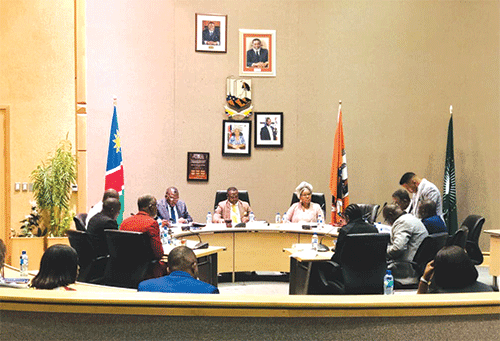The Khomas Regional Council boasts about providing basic services to many more of its inhabitants as well as progress on several infrastructure projects, despite mass urbanisation.
The region recorded numerous successes in economic growth; infrastructural development such as roads, bridges and properties/buildings; manufacturing; access to health facilities; access to schools; telecommunications equipment; and access to information communication technology (ICT) such as computers and laptops for the past 32 years.
Chief regional officer (CRO) Clement Mafwila told New Era that access to basic services has also improved in some areas.
“In terms of access to safe and clean water, in 1991, 99% of households had access to safe and clean water, whereas in 2016, the rate of households with access to safe and clean water was 100%,” he said.
The rate of households who used wood/charcoal for cooking decreased from 17% in 2011 to 7% in 2016.
The CRO said the success rate in terms of the provision of basic services is, however, minimal as the region is faced with a challenge of urbanisation, whereby there is a constant increase in the number of people relocating to Windhoek, especially to the informal settlements.
“This is putting extreme pressure on service-rendering institutions in the region in terms of the provision and delivery of basic services like water, electricity, roads infrastructure and sanitation,” he noted.
Mafwila illustrated that the population of Khomas increased from 167 071 in 1991 to 463 823 in 2019. As such, households with no access to toilets increased from 7% in 1991 to 25% in 2016. The households with access to electricity decreased from 78% in 1991 to 64% in 2016.
Water for all
As per the water intervention programme, during its phase three, the regional council drilled and installed boreholes for N$1.7 million in the various localities in the Windhoek Rural constituency where there is a lack of access to clean water. Phase four of the water intervention programme, at a total budget of N$1.8 million, also commenced last year.
Housing
To address housing needs in the informal settlements, the council entered into a joint partnership with the Ministry of Urban and Rural Development, the City of Windhoek and the National Housing Enterprise (NHE), using the Informal Settlement Upgrading Pilot Project. The project aims to construct 600 houses in phase one, and has thus far constructed 400 houses (in Onyika No 2 – Okuryangava, Goreangab Extension 4, Greenwell Matongo D, Otjomuise Extension 8 and 9, and Freedom Land A and B).
The council distributed N$8 million to this project.
Unemployment
As far as unemployment is concerned, the Khomas region continued with its small and medium enterprises (SMEs) support programme called the Income- Generating Activities project, under which SMEs
were assisted with equipment and
materials.
“A total of N$1.5 million was allocated
for this programme, with over 80 beneficiaries assisted. In addition to addressing unemployment, the council approved the agreement with the Association of Unemployed Artisans in Namibia to collaborate in the renovation of dilapidated buildings owned by
government in an effort that is geared towards the economic empowerment of unemployed artisans and the development of skills,
knowledge-sharing and mentorship,” he explained.
Regarding improvements in education, several infrastructure and maintenance developments were also undertaken last year.
Education
To cater for the increasing learner population, 48 classrooms were constructed at various schools at a value of over N$14 million.
“Each classroom holds a seating capacity of 35 learners, hence creating additional space for over 1 680 learners. Likewise, eight pre-primary classrooms were constructed at various primary schools at a value of N$1 860 000. There are also two ongoing capital construction projects at Havana Project Secondary School and Dr Abraham Iyambo Primary School at a value of over N$99 million,” he observed. Mafwila said other projects included the construction of ablution facilities and renovations of classroom and hostel blocks at various schools.
This year, the region will fund different projects through the minor capital projects’ programme, such as the Dagbreek School’s aquaponics upgrading project for N$400 000; minor renovations at the Hakahana Clinic for N$1 million; procurement of laboratory equipment for Biology, Chemistry and Physics at A Shipena Secondary School for N$500 000; the procurement of Wifi extension and five computers for the Katutura Community Library for N$150 000; and the renovation of six classrooms and ablution facilities at Jan Mohr Secondary School for N$400 000. Other projects the region will fund this year are the construction of pre-fabricated classrooms at Mountview High School for N$800 000; to address the need for classroom spaces for grade eight learners in Tobias Hainyeko and part of Moses Garoeb; the construction of pre-fabricated classrooms at Olof Palme Primary School for N$800 000 to address the lack of classroom space for grade one learners in the Samora Machel, Moses Garoeb and Tobias Hainyeko constituencies, respectively; as well as the procurement of 11 computers for the Fidel Castro Primary School in the Tobias Hainyeko constituency for N$150 000.
Council will continue to support SMEs through its income-generating activities’ programme with a budget of N$1.5 million, and will also continue to fund its various Rural Development Programmes.



